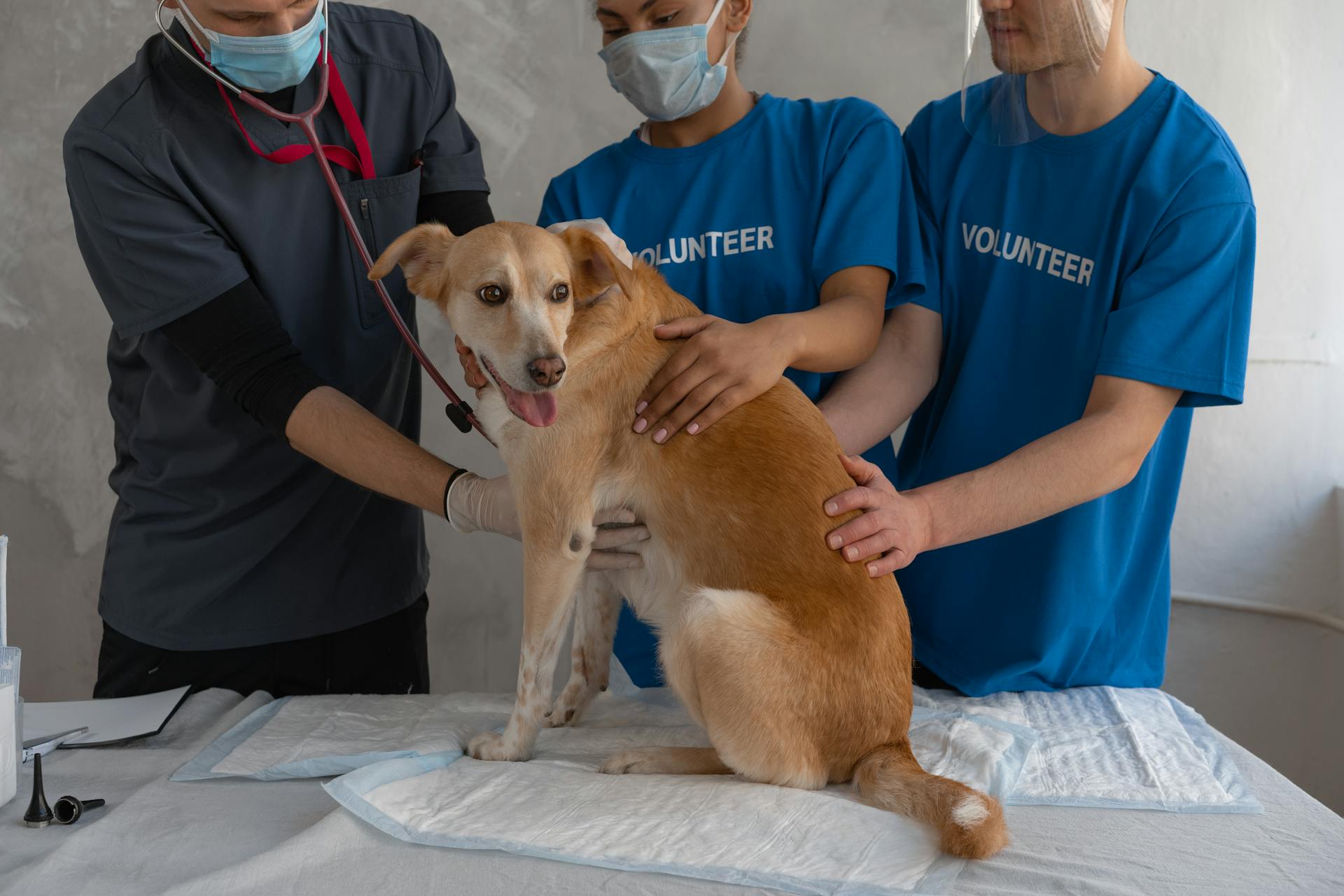
The stages of kennel cough can be divided into several distinct phases, each with its own set of symptoms and characteristics.
The first stage is the incubation period, which can last anywhere from 2-14 days. During this time, the dog is not showing any noticeable symptoms, but the virus is already multiplying in their system.
As the virus starts to take hold, the dog will begin to show symptoms such as a dry, hacking cough, which can be a sign that the kennel cough is progressing to the next stage.
The cough will become more persistent and may be accompanied by other symptoms such as sneezing, runny eyes, and nasal discharge.
A different take: When Do Dogs Grow Out of the Puppy Stage
Causes and Contributing Factors
Kennel cough is caused by a variety of pathogens that can be found in the environment or in other animals. Several viruses and bacteria can contribute to the development of kennel cough.
Some of the key culprits behind kennel cough include viruses such as canine parainfluenza virus, canine adenovirus type 2, and canine influenza virus (subtypes H3N2 and H3N8), as well as bacteria like Bordetella bronchiseptica.
Expand your knowledge: Canine Influenza vs Kennel Cough
In addition to these pathogens, other organisms like canine respiratory coronavirus, canine herpesvirus-1, canine distemper virus, Mycoplasma species, and Streptococcus equis subspecies zooepidemicus can also contribute to kennel cough.
Here are some of the key pathogens that can contribute to kennel cough, grouped by type:
- Viruses:
- Canine parainfluenza virus
- Canine adenovirus type 2
- Canine influenza virus (subtypes H3N2 and H3N8)
- Canine respiratory coronavirus
- Canine herpesvirus-1
- Canine distemper virus
- Bacteria:
- Bordetella bronchiseptica
- Mycoplasma species
- Streptococcus equis subspecies zooepidemicus
Organisms Contributing to CIRDC
Organisms contributing to CIRDC can be categorized into two groups: viruses and bacteria.
Several viruses can contribute to CIRDC, including canine parainfluenza virus, canine adenovirus type 2, canine influenza virus (subtypes H3N2 and H3N8), canine respiratory coronavirus, canine herpesvirus-1, and canine distemper virus.
Some of these viruses have vaccines available to protect against them, while others do not.
Here's a breakdown of the viruses that have vaccines available:
Bacteria like Bordetella bronchiseptica and Mycoplasma species can also contribute to CIRDC.
Incubation
Incubation is a critical factor in understanding the progression of canine cough. It usually takes between 3 to 10 days after exposure for the clinical manifestation of canine cough to become obvious.
The incubation period can vary, but it's essential to be aware that it can last for as long as 2 weeks in some cases.
This means that even if your dog seems fine, they could still be in the incubation period and not show symptoms yet.
For another approach, see: Stages of Canine Distemper
Dogs
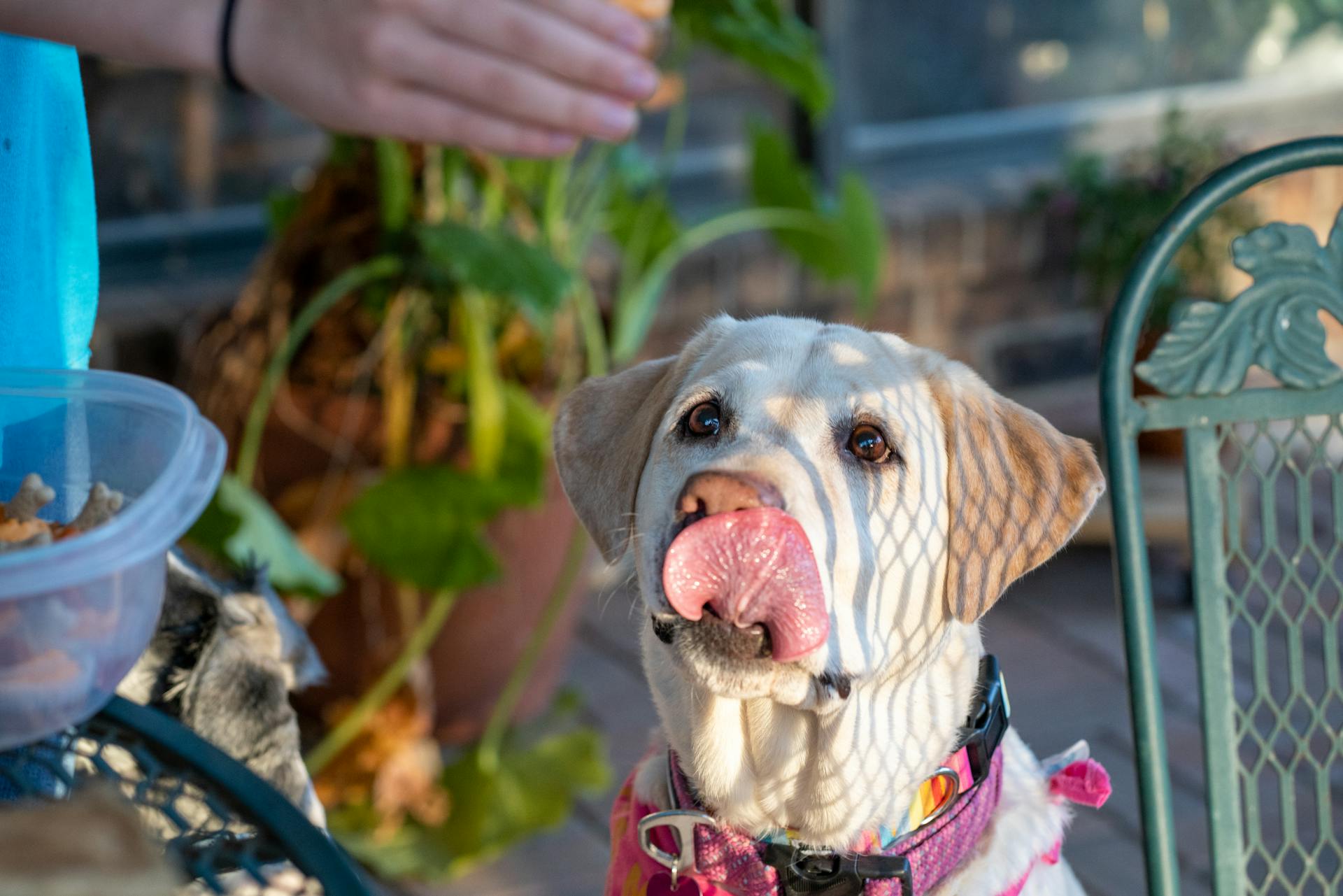
Dogs can get kennel cough from a combination of viruses and bacteria, which is why it's not caused by a single bug. This can lead to some pretty unpleasant symptoms.
The symptoms of kennel cough in dogs include a persistent dry, hacking cough, coughing during the night, and retching with white foam. Some dogs may also have clear eye drainage, a runny nose, and sneezing.
Tracheal sensitivity is another symptom, where your dog coughs when you apply gentle pressure to their trachea. This can be a sign that your dog needs to see a vet.
In severe cases, kennel cough can progress to more serious symptoms like lethargy, loss of appetite, fever, and labored breathing. If your dog is experiencing any of these symptoms, it's essential to see a vet right away.
Dogs with pre-existing respiratory diseases, brachycephalic dogs, puppies, geriatric dogs, and immune-compromised pets have a poorer prognosis for kennel cough. This is why it's crucial to keep your dog up-to-date on their vaccinations.
Here are some groups of dogs that have a better prognosis for kennel cough:
- Otherwise healthy and regularly vaccinated dogs
- Dogs that develop pneumonia, as long as they receive timely treatment
These dogs are more likely to make a full recovery from kennel cough.
Diagnosis
A diagnosis for kennel cough in dogs is typically made based on the dog's symptoms, history, and response to therapy.
Veterinarians usually don't need to identify the underlying bacteria or virus to make a diagnosis. However, diagnostic testing is recommended in certain situations, such as when pneumonia is suspected.
These situations include dogs that don't respond to supportive care, dogs with signs of systemic disease, and if an outbreak is occurring in multiple dogs.
What Are the Symptoms of?
If your dog has kennel cough, you may notice a persistent, forceful cough that sounds like a goose honk. This is the most obvious symptom.
Some dogs may also show other symptoms, such as sneezing, a runny nose, or eye discharge. These symptoms can be similar to those of a reverse sneeze, which is a normal occurrence in some dogs and breeds.
A strong cough, often with a "honking" sound, is the most obvious symptom of kennel cough. Other symptoms may include a runny nose, sneezing, lethargy, loss of appetite, and a low fever.
Recommended read: Signs of Kennel Cough in Humans
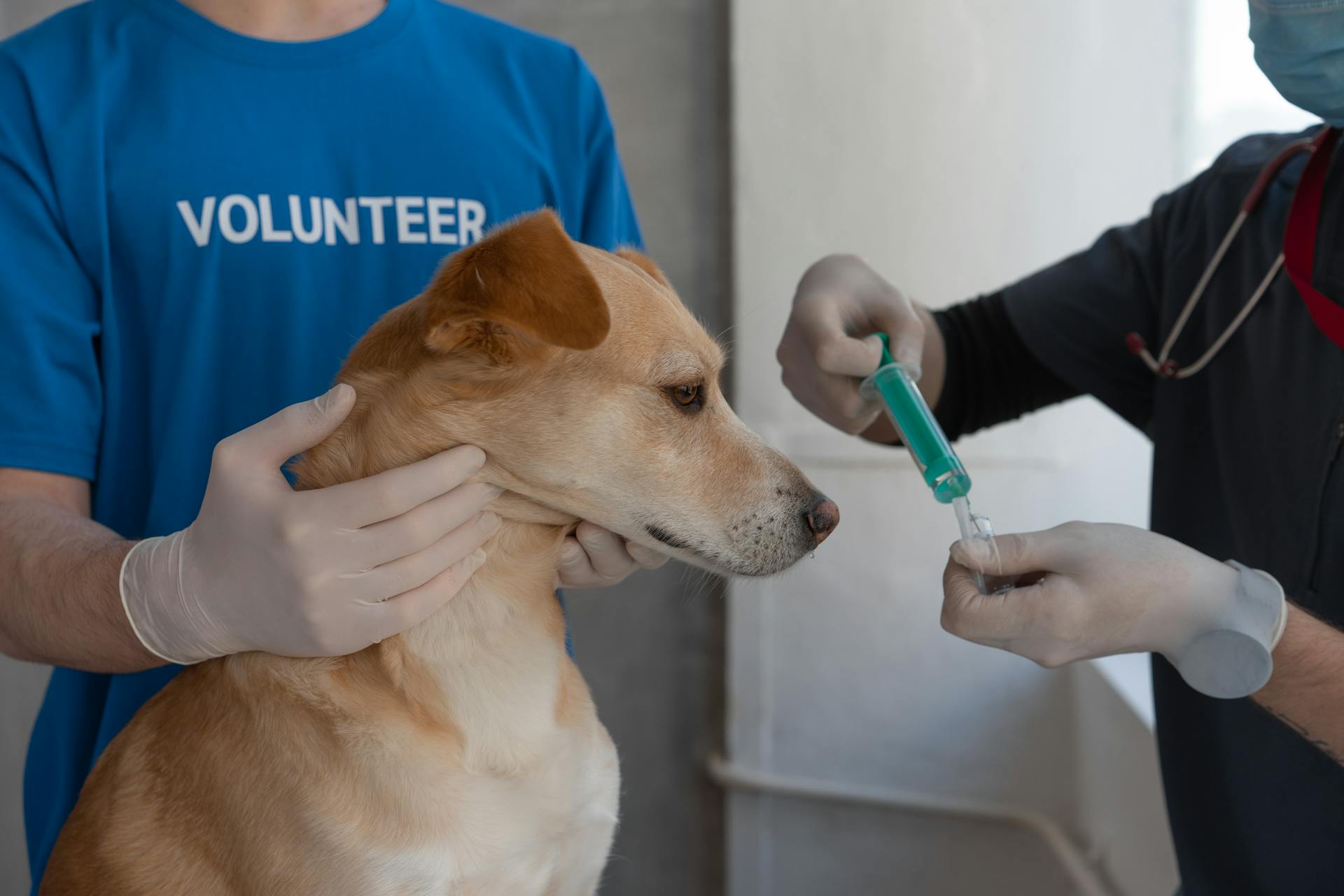
Here are some common symptoms of kennel cough:
- Strong cough, often with a “honking” sound
- Runny nose
- Sneezing
- Lethargy
- Loss of appetite
- Low fever
It's essential to report any coughing symptom to your veterinarian, as it could be a sign of a more serious disease, such as the canine distemper virus or canine influenza virus.
How Veterinarians Diagnose
Diagnosis can be a complex process, but veterinarians have a clear approach when it comes to diagnosing kennel cough in dogs. They consider the dog's symptoms, history, and response to therapy.
A veterinarian will typically not need to identify the underlying bacteria or virus to make a diagnosis. However, they may recommend diagnostic testing in certain situations.
Dogs that show signs of pneumonia, such as difficulty breathing or a persistent cough, may require diagnostic testing. This is because pneumonia can be a serious complication of kennel cough.
If a dog doesn't respond to supportive care, such as rest and hydration, a veterinarian may need to run some tests to determine the cause. This is especially true if the dog is showing signs of systemic disease.
For more insights, see: Can Kennel Cough Turn into Pneumonia
Diagnostic testing may also be recommended if an outbreak of kennel cough is occurring in multiple dogs. This helps veterinarians understand the scope of the outbreak and take steps to prevent further transmission.
Here are some situations where diagnostic testing is recommended:
- Dogs where pneumonia is suspected
- Dogs that do not respond to supportive care
- Dogs with signs of systemic disease
- If an outbreak is occurring in multiple dogs
Treatment and Recovery
Mild cases of kennel cough can be treated with a week or so of rest and supportive care, similar to how you'd treat your own common cold. Your dog's veterinarian may prescribe antibiotics to prevent secondary bacterial infection.
A cough suppressant may be prescribed by your dog's veterinarian to help reduce the frequency of the cough. Keeping your dog's airways moist is also essential, which can be achieved by keeping them in the bathroom while you shower or adding a humidifier to their sleep area.
Most dogs with kennel cough recover completely within 1 to 2 weeks, though it can take up to 6 weeks in older dogs or those with other medical conditions. If your dog doesn't improve within the expected amount of time, be sure to follow up with your veterinarian.
How Long Does It Last?
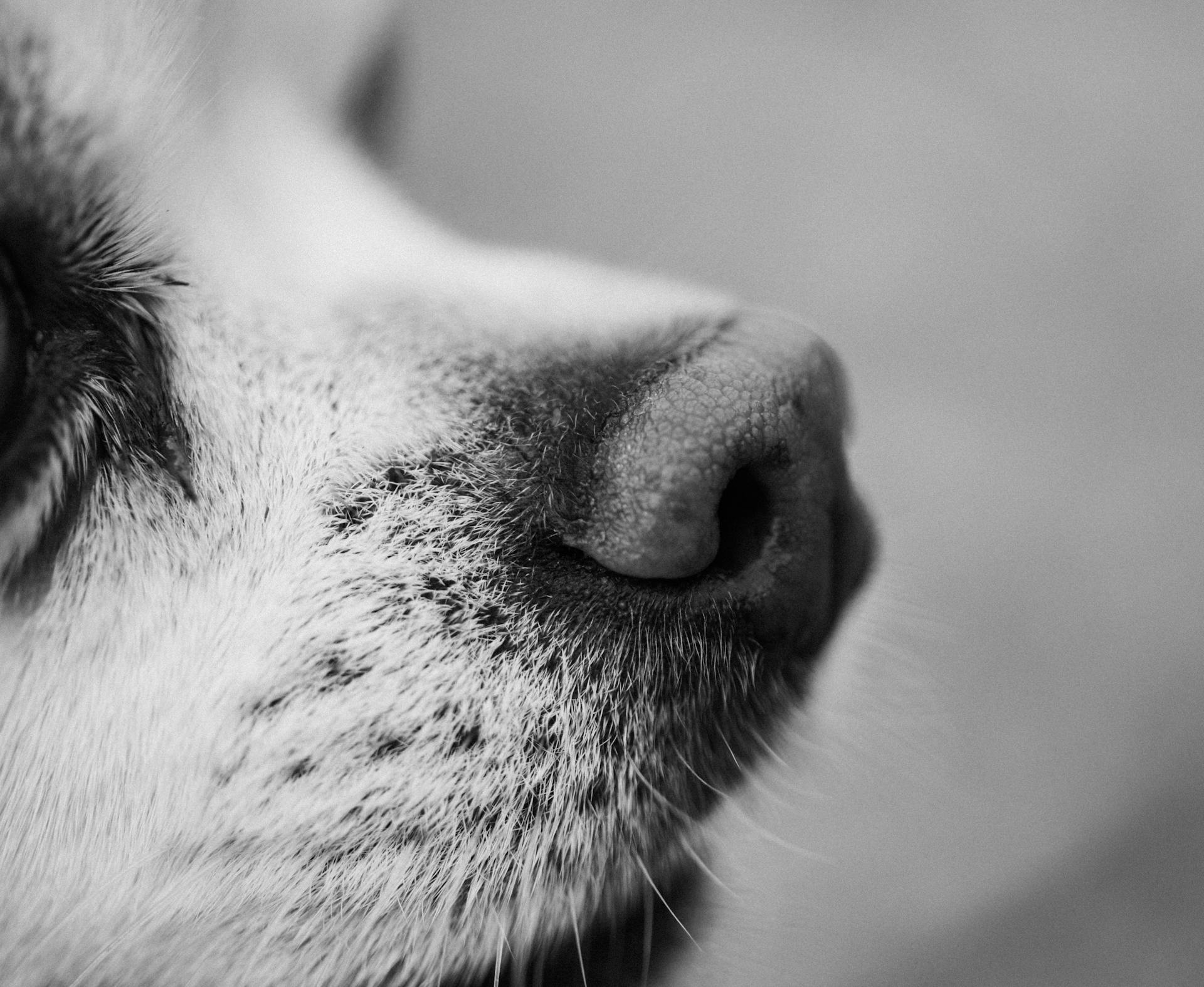
Most dogs with kennel cough recover completely within 1 to 3 weeks, though it can take up to 6 weeks in older dogs or those with other medical conditions.
If your dog doesn't improve within the expected amount of time, be sure to follow up with your veterinarian. This is crucial to prevent serious complications like pneumonia.
For otherwise healthy and regularly vaccinated dogs, the prognosis is excellent, and recovery usually takes 2 or 3 weeks.
However, if your dog has pre-existing respiratory diseases, is a brachycephalic breed, a puppy, geriatric, or immune-compromised, the prognosis is poorer and usually guarded.
Here's a rough estimate of recovery time for dogs with kennel cough:
Treatment
Treatment for kennel cough in dogs typically involves a combination of rest, supportive care, and medication. Your dog's veterinarian may prescribe antibiotics to prevent secondary bacterial infection.
Mild cases of kennel cough can be treated at home with rest, nutrition, and hydration. Keeping your dog's airways moist is crucial, and you can do this by letting them sit in the bathroom while you shower or by adding a humidifier to their sleeping area.
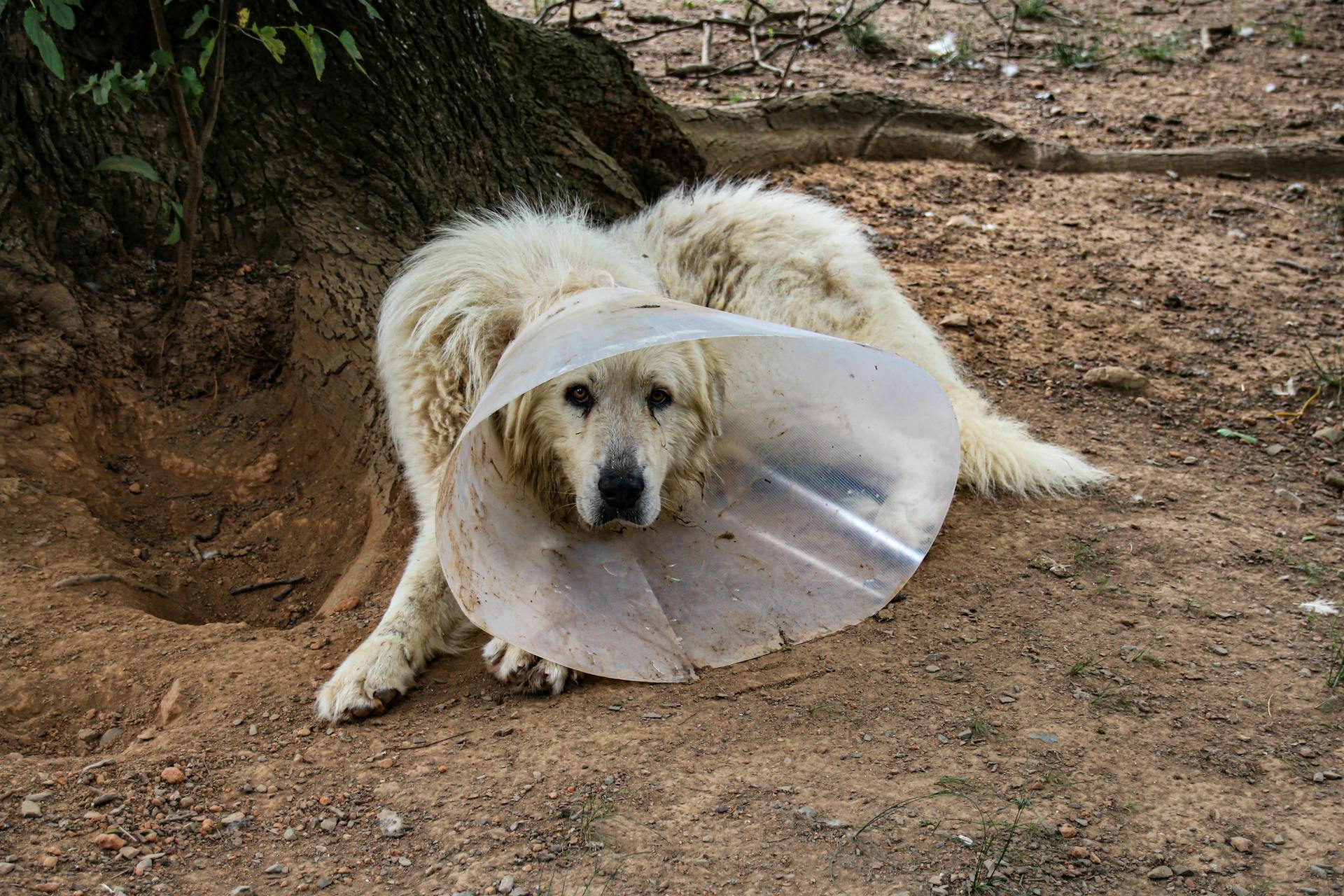
A cough suppressant may be prescribed to help reduce the frequency of the cough. This can be especially helpful if your dog is having trouble sleeping due to their cough.
In some cases, kennel cough can become complicated and lead to more serious health issues, such as pneumonia. If your dog develops pneumonia, hospitalization, intravenous fluids, antibiotics, and possibly oxygen therapy may be necessary.
It's essential to follow your veterinarian's treatment recommendations and keep your dog isolated from other pets to prevent the spread of kennel cough. Using a dog harness instead of a collar can also help reduce irritation to the tracheal area and alleviate coughing.
Related reading: Can Dogs Catch Pneumonia from Humans
Return
So you're finally on the road to recovery, and that's great news! Most vets can diagnose canine cough based on the patient's history and clinical symptoms.
You'll likely be prescribed antibiotics to combat the bacterial infection that's causing the cough.
A chest x-ray will be performed to rule out pneumonia, which changes the course of treatment and affects the outcome.
Your vet will closely monitor your dog's progress, adjusting the treatment plan as needed.
With proper care and rest, most dogs make a full recovery from kennel cough within 2-3 weeks.
Discover more: Holistic Treatment for Kennel Cough
When to See the Vet
If your dog's cough lasts more than a week or worsens, it's time to see the vet. The same goes if they seem extra tired or have a fever, with a normal body temperature ranging from 100 to 102.5 degrees F.
Their refusal to eat is also a red flag, as is the presence of other health problems. Your vet may ask you some questions to help determine the cause of the cough, such as whether your dog has trouble breathing between coughing fits or if the cough sounds like a goose or a seal.
They'll also want to know when the cough occurs and if it's related to eating, drinking water, exercise, or excitement. Is the cough dry or moist? Does it sound like your dog is about to vomit? Where has your dog been lately, and have there been any changes to their daily routine?
Here are some key questions your vet may ask:
- Does your dog have trouble breathing between coughing fits?
- When do they do it? (At night? After eating? After drinking water? After exercise? When they are excited?)
- What does it sound like? (A goose? A seal?)
- Is the cough dry or moist?
- Does it sound like they are about to vomit?
- Where has your dog been lately? (In a place with other dogs? With you on a family vacation? Around a smoker?)
- Have there been any changes to their daily routine?
- Are they up-to-date on their vaccines and heartworm prevention?
- When did they last take their medication?
Frequently Asked Questions
What are the worst days of kennel cough?
The worst days of kennel cough typically occur within the first few days, characterized by intense coughing fits that can lead to vomiting. This initial phase is usually the most severe and uncomfortable for dogs.
How do you know if kennel cough turns into pneumonia?
Look out for labored breathing, a persistent cough, high fever, and nasal discharge, which can indicate pneumonia has developed from kennel cough
Sources
- https://www.webmd.com/pets/dogs/kennel-cough-in-dogs
- https://www.avma.org/resources-tools/pet-owners/petcare/canine-infectious-respiratory-disease-complex-kennel-cough
- https://www.akc.org/expert-advice/health/kennel-cough-in-dogs/
- https://www.petmd.com/dog/conditions/respiratory/kennel-cough-dogs-symptoms-and-treatments
- https://perthvetcare.com.au/pet-library/kennel-cough-in-dogs/
Featured Images: pexels.com


